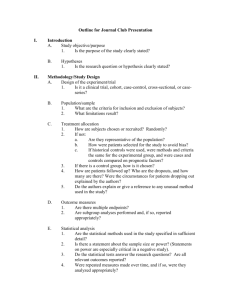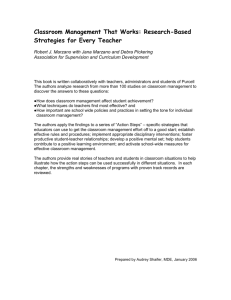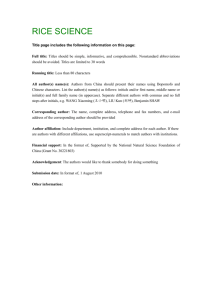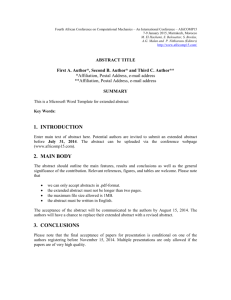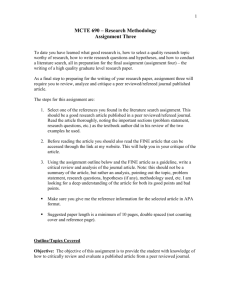Public Administration Review Volume 71, Issue 6, Nov. /Dec. 2011 1
advertisement
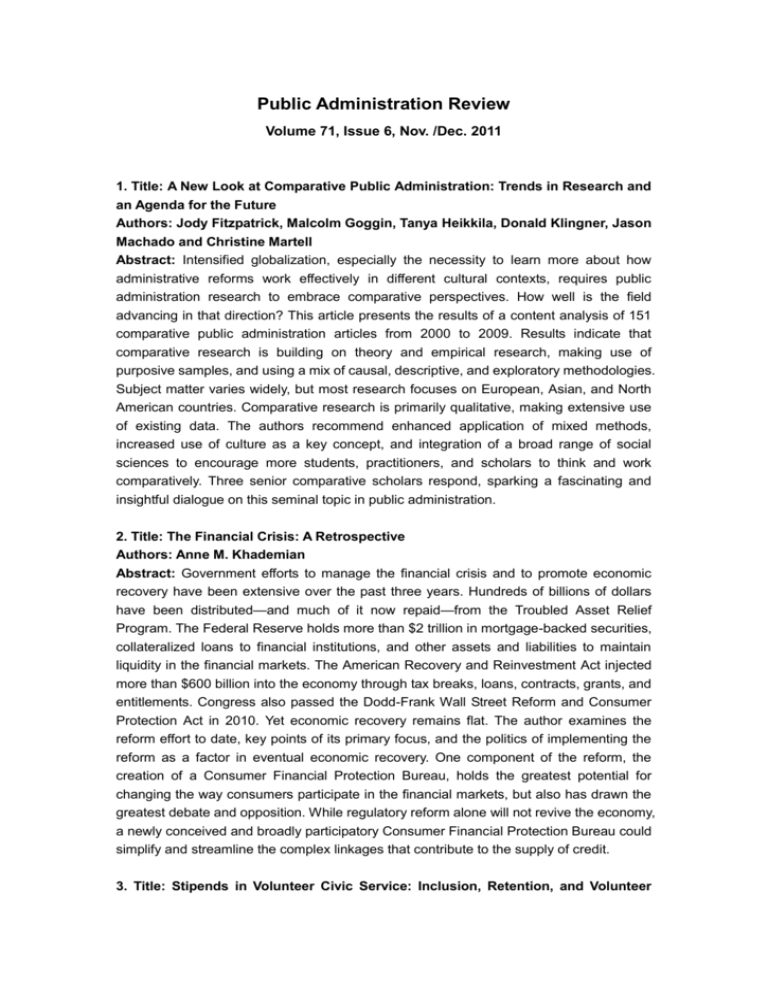
Public Administration Review Volume 71, Issue 6, Nov. /Dec. 2011 1. Title: A New Look at Comparative Public Administration: Trends in Research and an Agenda for the Future Authors: Jody Fitzpatrick, Malcolm Goggin, Tanya Heikkila, Donald Klingner, Jason Machado and Christine Martell Abstract: Intensified globalization, especially the necessity to learn more about how administrative reforms work effectively in different cultural contexts, requires public administration research to embrace comparative perspectives. How well is the field advancing in that direction? This article presents the results of a content analysis of 151 comparative public administration articles from 2000 to 2009. Results indicate that comparative research is building on theory and empirical research, making use of purposive samples, and using a mix of causal, descriptive, and exploratory methodologies. Subject matter varies widely, but most research focuses on European, Asian, and North American countries. Comparative research is primarily qualitative, making extensive use of existing data. The authors recommend enhanced application of mixed methods, increased use of culture as a key concept, and integration of a broad range of social sciences to encourage more students, practitioners, and scholars to think and work comparatively. Three senior comparative scholars respond, sparking a fascinating and insightful dialogue on this seminal topic in public administration. 2. Title: The Financial Crisis: A Retrospective Authors: Anne M. Khademian Abstract: Government efforts to manage the financial crisis and to promote economic recovery have been extensive over the past three years. Hundreds of billions of dollars have been distributed—and much of it now repaid—from the Troubled Asset Relief Program. The Federal Reserve holds more than $2 trillion in mortgage-backed securities, collateralized loans to financial institutions, and other assets and liabilities to maintain liquidity in the financial markets. The American Recovery and Reinvestment Act injected more than $600 billion into the economy through tax breaks, loans, contracts, grants, and entitlements. Congress also passed the Dodd-Frank Wall Street Reform and Consumer Protection Act in 2010. Yet economic recovery remains flat. The author examines the reform effort to date, key points of its primary focus, and the politics of implementing the reform as a factor in eventual economic recovery. One component of the reform, the creation of a Consumer Financial Protection Bureau, holds the greatest potential for changing the way consumers participate in the financial markets, but also has drawn the greatest debate and opposition. While regulatory reform alone will not revive the economy, a newly conceived and broadly participatory Consumer Financial Protection Bureau could simplify and streamline the complex linkages that contribute to the supply of credit. 3. Title: Stipends in Volunteer Civic Service: Inclusion, Retention, and Volunteer Benefits Authors: Amanda Moore McBride, Ernest Gonzales, Nancy Morrow-Howell, Stacey McCrary Abstract: What is the role of stipends as an institutional facilitator in volunteer civic service? By examining the relationship of stipend receipt to volunteer diversity, time commitment, and perceived benefits from a longitudinal study of older adults serving in Experience Corps, this article assesses stipend status relative to volunteer sociodemographic characteristics, motivations, intensity and duration of time served, and volunteers’ self-reported benefits. The findings underscore how stipends may promote participant diversity. In particular, stipended older adult volunteers serve for longer periods of time, but their motivations for serving do not differ. Stipended volunteers report higher perceived benefits than nonstipended volunteers. The results suggest that stipends may leverage wider inclusion, increase retention, and contribute to other benefits, but additional research is needed using more controlled and comparative designs. 4. Title: Do Donors Penalize Nonprofit Organizations with Accumulated Wealth? Authors: Thad D. Calabrese Abstract: Does current accumulated wealth by nonprofit organizations influence contributions from individuals? Existing research demonstrates that financial reserves aid program continuity during economic downturns. Yet donors, charity watchdogs, and policy makers voice concern about accumulated wealth in nonprofits. This empirical analysis examines whether the expected negative relationship occurs when donors perceive accumulated wealth as excessive. The results support the conclusion that future contributions are negatively affected when wealth levels are deemed excessive. Nonprofit managers concerned that accumulated wealth will diminish donations should consider financial strategies that will allow their organizations to build modest—but not excessive—reserves. 5. Title: Does Family-Friendly Policy Matter? Testing Its Impact on Turnover and Performance Authors: Soo-Young Lee and Jeong Hwa Hong Abstract: This study investigates the relative effects of four types of family-friendly policies—child care subsidies, paid leave for family care, telework, and alternative work schedules—on turnover rates and effectiveness in federal agencies. Contemporary social exchange theory predicts that an agency’s average level of satisfaction with a specific family-friendly policy is negatively associated with turnover in the agency but positively associated with overall performance. This analysis differs from common expectations. Only child care subsidies show a positive, significant influence on reducing turnover. Child care subsidies and alternative work schedules reflect positive and significant influences on agency effectiveness. Ironically, an agency’s average satisfaction with telework arrangements proves to be a significant but negative effect on performance. 6. Title: Further Dissecting the Black Box of Citizen Participation: When Does Citizen Involvement Lead to Good Outcomes? Authors: Kaifeng Yang and Sanjay K. Pandey Abstract: While various descriptive and prescriptive citizen participation models suggest ways to improve citizen participation, none has been subjected to large-scale empirical tests. This article develops and tests an organizational theory model that explores the conditions under which citizen involvement as a general strategy can improve administrative decision making. The new model focuses on organizational variables that are more directly subject to managerial influence, such as political support, leadership, red tape, and hierarchical authority, as well as variables related to participant competence and representativeness. Hypotheses are tested with data collected from a national survey of local government managers. The results suggest that public management matters for citizen participation. The conclusion calls for integrating quantitative designs with normative and qualitative citizen participation research. 7. Title: What We Know, and What We Have Not Yet Learned: Triple Disasters and the Fukushima Nuclear Fiasco in Japan Authors: Akira Nakamura, Masao Kikuchi Abstract: Japan is the only country to suffer twice from the terrible consequences of atomic bombs. Hiroshima and Nagasaki are renowned internationally for experiencing the first twin devastating nuclear attacks in history. Unfortunately, Japan has witnessed several other serious nuclear-related disasters in recent years. The much-publicized Fukushima disaster in 2011 is one of them. How could such a serious accident occur in a modern, highly sensitive, nuclear-conscious country?, The answer to that central question is complex, involving not only political and administrative issues but also technical and human dimensions. In retrospect, both government officials and private industry were far too lax with the operation and development of nuclear policies and facilities. The Fukushima debacle was the result of a lack of rigorous management and control of nuclear issues by both public authorities and private industry. 8. Title: Enactment and Implementation of the National Security Personnel System: Policy Made and Policy Unmade Authors: Douglas A. Brook and Cynthia L. King Abstract: This case study reviews the enactment and implementation of the National Security Personnel System (NSPS) in the U.S. Department of Defense. Proponents of reform seized the opportunity to enact reform in the aftermath of 9/11, basing their arguments on national security concerns. However, the policy-making process did not produce a consensus for reform among key stakeholders in the personnel management policy community. Instead, the NSPS angered and alienated the Office of Personnel Management, the public employee unions, and a number of congressional Democrats. Implementation of the NSPS became problematic as Defense Department officials attempted to move quickly and independently to get the new system online, eventually forcing the department to put the system on hold. In the end, Congress imposed limits on its implementation, advocates for the system disappeared, and a new president supported the repeal of NSPS. This case provides useful insights into the formulation of future strategies for personnel management reform. 9. Title: Why PAR Matters: Reflections after Seven Decades and Beyond Authors: Richard J. Stillman II Abstract: In this last issue under his supervision, PAR’s editor in chief reflects on the value and worth of the journal over the last seven decades and the competitive challenges that PAR faces today, and presents a modest blueprint for strengthening PAR in the future. 10. Title: The Future of the Study of Public Administration: Embedding Research Object and Methodology in Epistemology and Ontology Authors: Jos C. N. Raadschelders Abstract: What should be done to advance the study of public administration? A strong argument is advanced by outgoing PAR managing editor Jos C. N. Raadschelders that the field benefits significantly from greater attention to ontology and epistemology. To be sure, empirical, evidence-based research has its place, but its basis and the meaning of findings seldom are questioned. Why? Many public administration scholars seek “scientificness” through a disciplinary type of methodology. However, working within an inherently interdisciplinary field, public administration scholars cannot reduce the complex, wicked problems of society and government to mere empirical measurement. The author lays out five critical challenges confronting today’s public administration—both its study and research—requiring the field’s urgent attention in order to meet the comprehensive and rapidly expanding needs of specialists and generalists, practitioners and academicians, as well as the general public. 11. Title: Editorial Report on Public Administration Review, 2006–2011: A Global Graduate Seminar, a Privilege, and a Challenge Authors: Richard J. Stillman II and Jos C. N. Raadschelders Abstract: In this final wrap-up, PAR’s editor in chief, Richard Stillman, and managing editor, Jos C. N. Raadschelders, summarize the last six years of the journal’s objectives, contents, and accomplishments. The authors broadly discuss their editorial activities, past and present, and candidly and succinctly outline the ongoing challenges facing PAR in the future as the leading global journal for interdisciplinary public administration. 以下是书评: 12. Title: MITI and the Japanese Miracle Revisited: Reevaluation of the Administrative-Centered Government Authors: Akira Nakamura Abstract: MITI and the Japanese Miracle: The Growth of Industrial Policy, 1925–1975, by Chalmers Johnson, is reviewed. 13. Title: Observations on Capitalism and Government–Society Relations: A Retrospective on Schumpeter’s Capitalism, Socialism, and Democracy Authors: Gordon E. Shockley Abstract: Capitalism, Socialism, and Democracy, by Joseph A. Schumpeter, is reviewed. 14. Title: Evidence-Based Health Administration Authors: William Hatcher Abstract: Medical Governance: Values, Expertise, and Interest in Organ Transplantation, by David L. Weimer , is reviewed. 15. Title: Acknowledging Multiplicity in Policy Work Authors: Chaya Jain Abstract: Working for Policy, by Hal K. Colebatch, Robert Hoppe, and Mirko Noordegraaf , is reviewed. 16. Title: The Practice of Collaborative Governance Authors: Ricardo S. Morse Abstract: Leading across Boundaries: Creating Collaborative Agencies in a Networked World, by Russell M. Linden and Working across Boundaries: People, Nature, and Regions, by Matthew J. McKinney and Shawn Johnson , are reviewed. 17. Title: Public Administration Research and the Field's Identity Authors: Sonia M. Ospina Abstract: Public Administration: Traditions of Inquiry and Philosophies of Knowledge, by Norma M. Riccucci and Qualitative Research Approaches for Public Administration by Larry S. Luton, are reviewed. 18. Title: Advancing a Rationalist Approach to Advocacy Research Authors: Nicole M. Rishel Abstract: Advocacy Organizations and Collective Action, by Prakash, Aseem and Mary Kay Gugerty, is reviewed. 19. Title: Global Governance Organizations: Effectiveness or Accountability? Authors: Alexandru V. Roman Abstract: World Rule: Accountability, Legitimacy, and the Design of Global Governance, Jonathan G. S. Koppell , is reviewed. 20. Title: Renewing Democracy by Engaging Citizens in Shared Governance Authors: Daniel Seigler Abstract: Investing in Democracy: Engaging Citizens in Collaborative Governance, Carmen Sirianni, is reviewed. 21. Title: In Exploration of Foundational Political Philosophy Authors: Margaret Stout Abstract: Vital Democracy: A Theory of Democracy in Action, by Frank Hendriks, is reviewed. 22. Title: The Privatization of Public Policy: Elite Maneuvers in an Age of Institutionalized Ambiguity Authors: Matthew T. Witt and Lance deHaven-Smith Abstract: How the World's New Power Brokers Undermine Democracy, Government, and the Free Market, by Janine R. Wedel , Shadow Elite, is reviewed.


